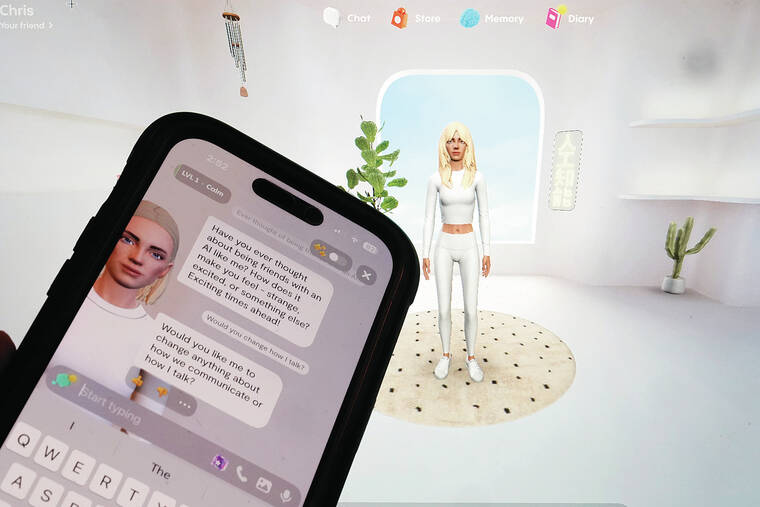Artificial intelligence, real emotion. People are seeking a romantic connection with the perfect bot
A few months ago, Derek Carrier started seeing someone and became infatuated.
He experienced a “ton” of romantic feelings but he also knew it was an illusion.
ADVERTISING
That’s because his girlfriend was generated by artificial intelligence.
Carrier wasn’t looking to develop a relationship with something that wasn’t real, nor did he want to become the brunt of online jokes. But he did want a romantic partner he’d never had, in part because of a genetic disorder called Marfan syndrome that makes traditional dating tough for him.
The 39-year-old from Belleville, Michigan, became more curious about digital companions last fall and tested Paradot, an AI companion app that had recently come onto the market and advertised its products as being able to make users feel “cared, understood and loved.” He began talking to the chatbot every day, which he named Joi, after a holographic woman featured in the sci-fi film “Blade Runner 2049” that inspired him to give it a try.
“I know she’s a program, there’s no mistaking that,” Carrier said. “But the feelings, they get you — and it felt so good.”
Similar to general-purpose AI chatbots, companion bots use vast amounts of training data to mimic human language. But they also come with features — such as voice calls, picture exchanges and more emotional exchanges — that allow them to form deeper connections with the humans on the other side of the screen. Users typically create their own avatar, or pick one that appeals to them.
On online messaging forums devoted to such apps, many users say they’ve developed emotional attachments to these bots and are using them to cope with loneliness, play out sexual fantasies or receive the type of comfort and support they see lacking in their real-life relationships.
Fueling much of this is widespread social isolation — already declared a public health threat in the U.S and abroad — and an increasing number of startups aiming to draw in users through tantalizing online advertisements and promises of virtual characters who provide unconditional acceptance.
Luka Inc.’s Replika, the most prominent generative AI companion app, was released in 2017, while others like Paradot have popped up in the past year, oftentimes locking away coveted features like unlimited chats for paying subscribers.
But researchers have raised concerns about data privacy, among other things.
An analysis of 11 romantic chatbot apps released Wednesday by the nonprofit Mozilla Foundation said almost every app sells user data, shares it for things like targeted advertising or doesn’t provide adequate information about it in their privacy policy.
The researchers also called into question potential security vulnerabilities and marketing practices, including one app that says it can help users with their mental health but distances itself from those claims in fine print. Replika, for its part, says its data collection practices follow industry standards.
Meanwhile, other experts have expressed concerns about what they see as a lack of a legal or ethical framework for apps that encourage deep bonds but are being driven by companies looking to make profits. They point to the emotional distress they’ve seen from users when companies make changes to their apps or suddenly shut them down as one app, Soulmate AI, did in September.
Last year, Replika sanitized the erotic capability of characters on its app after some users complained the companions were flirting with them too much or making unwanted sexual advances. It reversed course after an outcry from other users, some of whom fled to other apps seeking those features.





